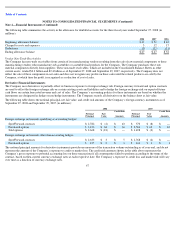Apple 2008 Annual Report Download - page 61
Download and view the complete annual report
Please find page 61 of the 2008 Apple annual report below. You can navigate through the pages in the report by either clicking on the pages listed below, or by using the keyword search tool below to find specific information within the annual report.
Table of Contents
NOTES TO CONSOLIDATED FINANCIAL STATEMENTS
Note 1—Summary of Significant Accounting Policies
Apple Inc. and its wholly-owned subsidiaries (collectively “Apple” or the “Company”) design, manufacture, and market personal computers,
portable digital music players, and mobile communication devices and sell a variety of related software, services, peripherals, and networking
solutions. The Company sells its products worldwide through its online stores, its retail stores, its direct sales force, and third-party wholesalers,
resellers, and value-added resellers. In addition, the Company sells a variety of third-party Mac, iPod and iPhone compatible products including
application software, printers, storage devices, speakers, headphones, and various other accessories and supplies through its online and retail
stores. The Company sells to consumer, small and mid-sized business (“SMB”), education, enterprise, government, and creative customers.
Basis of Presentation and Preparation
The accompanying Consolidated Financial Statements include the accounts of the Company. Intercompany accounts and transactions have been
eliminated. The preparation of these Consolidated Financial Statements in conformity with U.S. generally accepted accounting principles
requires management to make estimates and assumptions that affect the amounts reported in these Consolidated Financial Statements and
accompanying notes. Actual results could differ materially from those estimates. Certain prior year amounts in the Consolidated Financial
Statements and notes thereto have been reclassified to conform to the current year presentation.
The Company’s fiscal year is the 52 or 53-week period that ends on the last Saturday of September. The Company’s first quarter of fiscal years
2008 and 2007 contained 13 weeks and the first quarter of fiscal year 2006 contained 14 weeks. The Company’s fiscal years 2008 and 2007
ended on September 27, 2008 and September 29, 2007, respectively, included 52 weeks, while fiscal year 2006 ended on September 30, 2006
included 53 weeks. Unless otherwise stated, references to particular years or quarters refer to the Company’
s fiscal years ended in September and
the associated quarters of those fiscal years.
Financial Instruments
Cash Equivalents and Short-term Investments
All highly liquid investments with maturities of three months or less at the date of purchase are classified as cash equivalents. Highly liquid
investments with maturities greater than three months at the date of purchase are classified as short-term investments. The Company’s debt and
marketable equity securities have been classified and accounted for as available-for-sale. Management determines the appropriate classification
of its investments in debt securities at the time of purchase and reevaluates the available-for-sale designations as of each balance sheet date.
These securities are carried at fair value, with the unrealized gains and losses, net of taxes, reported as a component of shareholders’ equity. The
cost of securities sold is based upon the specific identification method.
Derivative Financial Instruments
The Company accounts for its derivative instruments as either assets or liabilities and carries them at fair value. Derivatives that are not defined
as hedges in Statement of Financial Accounting Standards (“SFAS”) No. 133, Accounting for Derivative Instruments and Hedging Activities, as
amended, must be adjusted to fair value through earnings.
For derivative instruments that hedge the exposure to variability in expected future cash flows that are designated as cash flow hedges, the
effective portion of the gain or loss on the derivative instrument is reported as a component of accumulated other comprehensive income in
shareholders’ equity and reclassified into earnings in the same period or periods during which the hedged transaction affects earnings. The
ineffective portion of the gain or loss on the derivative instrument is recognized in current earnings. To receive hedge accounting treatment, cash
flow hedges must be highly effective in offsetting changes to expected future cash flows on hedged transactions. For options designated as cash
flow hedges, changes in the time value are excluded from the assessment of hedge effectiveness and are recognized in earnings. For derivative
instruments that hedge the exposure to changes in the fair value of an asset or a liability and that are designated as fair value hedges, the net
58
























